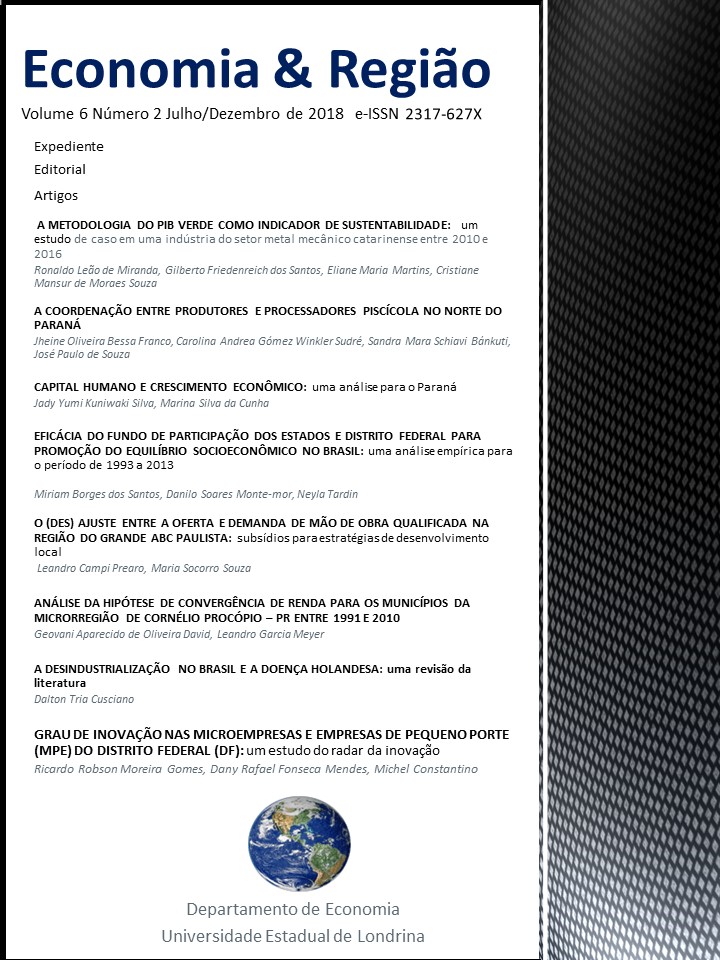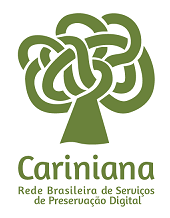The methodology of green gdp as a sustainability indicator: a case study in an industry of the mechanical metal sector in the state of Santa Catarina, Brazil between 2010 and 2016
DOI:
https://doi.org/10.5433/2317-627X.2018v6n2p7Keywords:
Environmental degradation, Ecological partner system, Green GDP, Industry of Santa CatarinaAbstract
The main objective of this study is to identify the value and contribution of the green GDP as an indicator of sustainability, having as a case study an industry of the metalworking industry in Santa Catarina, with research period from 2010 to 2016. To legitimize the objective proposed, it is used the fundamental equation of the green PIB, adapting it to its measurement in the studied industry, making possible its use as indicator of sustainability of the industrial activity in question. From the point of view of methodological procedures, it is an exploratory, descriptive, explanatory, bibliographic, documentary and ex post facto study. As for the results of the industry studied, there is much to be improved, since in the future years the industry will continue to increase its industrial GDP and green GDP will remain with the average percentage change of 57% in relation to industrial GDP, according to the calculations, the consequence is the unsustainability of its industrial activity in the medium and long term. Therefore, given the results and from the point of view of regional development, the green GDP brings not only the result of local or regional business sustainability, but the results of the current business productive scenario.References
BIGGS, R.; Schluter, M.; Schoon, M. L. Principles for building resilience: sustaining ecosystem services in Social Ecological Systems. Cambridge: Cambridge University Press. 2014.
BM&FBOVESPA. Relatório Financeiro WEG S.A. Disponível em: http://www.bmfbovespa.com.br/pt_br/produtos/listados-a-vista-e-derivativos/renda-variavel/empresas-listadas.htm?codigo=5410. Acesso em: 10 nov. 2017;
FENECH, F. C. Presentación y evaluación de la contabilidade social y medioambiental. Curso de verano de la Universidade de Burgo. 2002. Disponível em: www.ubu.es. Acesso em 19 nov. 2017.
FUNDACIÓ FÓRUM AMBIENTAL. Agencia Europea Del Médio Ambiente. Barcelona, abril de 2001. Perfil profesional del responsable de medio ambiente en las organizaciones. 2016. Disponível em: www.forumambiental.com. Acesso em: 27 nov. 2017.
HAJE, L. Aprovada criação de PIB Verde para avaliar patrimônio ecológico. 2015. Disponível em: http://www2.camara.leg.br/camaranoticias/noticias/meio-ambiente/486336-aprovada-criacao-de-pib-verde-para-avaliar patrimonio-ecologico.html. Acesso em: 30 set. 2017.
IGP-M - Índice Geral de Preços do Mercado. Disponível em: http://drcalc.net/easycalc/correcao.asp. Acesso. 30 set. 2017.
MA - Millenium Assessment. Ecossystem and Human well-being: Current state and trends. Washington, DC: island Press. 2005.
MONTIBELLER FILHO, G. O mito do desenvolvimento sustentável: meio ambiente e custos sociais no moderno sistema produtor de mercadorias. Florianópolis: Editora da UFSC. 2001.
MOTTA, R. S. da. Economia Ambiental. Rio de Janeiro: Editora FGV. 2006.
NOVAES, W. PIB Verde e Índice de Riqueza, bons caminhos. Estadão, 07 maio 2015. 2015. Disponível em: http://opiniao.estadao.com.br/noticias/geral,pib-verde-e-indice-de-riqueza-bons-caminhos,1683458. Acesso em: 20 out. 2017.
PNUMA – Programa das Nações Unidas para o Meio Ambiente. Rumo a uma economia verde: caminhos para o desenvolvimento sustentável e a erradicação da pobreza. Press Release United Nations Environment Programme, 2011. Disponível em: http://www.pnuma.org.br/admin/publicacoes/texto/1101-GREENECONOMY synthesis_PT_online.pdf. Acesso em: 03 set. 2017.
POLANYI, K. A Grande Transformação. Prefácio de Robert M. MacIver. Nova Iorque: Farrar & Rinehart. 1944.
RAMOS, A. G. A. Síndrome comportamentalista; Política cognitiva; Teoria da delimitação dos sistemas sociais. In: RAMOS, A. G. A. A Nova ciência das organizações: uma reconceituação da riqueza das nações. 2. ed. Rio de Janeiro: Fundação Getúlio Vargas. Cap. 3, p. 50-68. 1989.
RIBEIRO, M. S; LISBOA L. P. Balanço Social. Revista Brasileira de Contabilidade, v. 28, n. 115, p.72-81, jan./fev. 1999.
ROMEIRO, A. R. Economia ou economia política da sustentabilidade. In: MARY, Peter H. e LUSTOSA, Maria Cecília e Vinha, Valéria da. In: Economia do meio ambiente: Teoria e prática. Rio de Janeir: Elsevier. 2003.
ROSSETTI, J. P. Introdução à Economia. 18. ed. São Paulo: Atlas. 2000.
SACHS, I. Estratégias de transição para o século XXI: desenvolvimento e meio ambiente. Tradução Magda Lopes. São Paulo: Studio Nobe, 1993.
SAMAE, Jaraguá do Sul. Disponível em: http://www.samaejs.com.br. Acesso: 15 nov. 2017.
VAN BELLEN, Hans Michael. Indicadores de Sustentabilidade: Uma análise comparativa. 2002. 235 f. Tese (Doutorado) - Curso de Engenharia de Produção, Departamento de Engenharia, Universidade Federal de Santa Catarina, Florianópolis, 2002. Disponível em: https://repositorio.ufsc.br/xmlui/bitstream/handle/123456789/84033/189898.pdf?sequence=1&isAllowed=y. Acesso em: 23 fev. 2018.
YOUNG, C. E. F; LUSTOSA, M.C.J. Meio ambiente e competitividade na indústria brasileira. Rio de Janeiro: IE-UFRJ. (mimeo). 2000.
YOUNG, C. E. F. Contabilidade Ambiental Nacional: Fundamentos Teóricos e Aplicação Empírica no Brasil. In: AY, P. H. (Org.). Economia do Meio-Ambiente: teoria e prática. São Paulo: Elsevier, 2003. Cap. 6, p. 133-59.
YOUNG, C. E. F; PEREIRA, A. A; HARTJE, B. C. R. Sistema de Contas Ambientais para o Brasil: estimativas preliminares. Rio de Janeiro: UFRJ, 2000. Texto para discussão, n. 448
Downloads
Published
How to Cite
Issue
Section
License
Economia & Região adota a Licença Creative Commons Attribution CC-BY 4.0 International, portanto, os direitos autorais relativos aos artigos publicados são do(s) autor(es), que cedem à Revista Economia & Região o direito de exclusividade de primeira publicação.
Sob essa licença é possível: Compartilhar - copiar e redistribuir o material em qualquer suporte ou formato. Adaptar - remixar, transformar, e criar a partir do material, atribuindo o devido crédito e prover um link para a licença e indicar se mudanças foram feitas.














